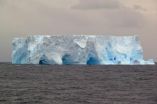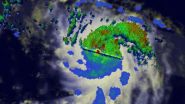(Press-News.org) CORVALLIS, Ore. – A new study has found that the Antarctic Ice Sheet began melting about 5,000 years earlier than previously thought coming out of the last ice age – and that shrinkage of the vast ice sheet accelerated during eight distinct episodes, causing rapid sea level rise.
The international study, funded in part by the National Science Foundation, is particularly important coming on the heels of recent studies that suggest destabilization of part of the West Antarctic Ice Sheet has begun.
Results of this latest study are being published this week in the journal Nature. It was conducted by researchers at University of Cologne, Oregon State University, the Alfred-Wegener-Institute, University of Hawaii at Manoa, University of Lapland, University of New South Wales, and University of Bonn.
The researchers examined two sediment cores from the Scotia Sea between Antarctica and South America that contained "iceberg-rafted debris" that had been scraped off Antarctica by moving ice and deposited via icebergs into the sea. As the icebergs melted, they dropped the minerals into the seafloor sediments, giving scientists a glimpse at the past behavior of the Antarctic Ice Sheet.
Periods of rapid increases in iceberg-rafted debris suggest that more icebergs were being released by the Antarctic Ice Sheet. The researchers discovered increased amounts of debris during eight separate episodes beginning as early as 20,000 years ago, and continuing until 9,000 years ago.
The melting of the Antarctic Ice Sheet wasn't thought to have started, however, until 14,000 years ago.
"Conventional thinking based on past research is that the Antarctic Ice Sheet has been relatively stable since the last ice age, that it began to melt relatively late during the deglaciation process, and that its decline was slow and steady until it reached its present size," said lead author Michael Weber, a scientist from the University of Cologne in Germany.
"The sediment record suggests a different pattern – one that is more episodic and suggests that parts of the ice sheet repeatedly became unstable during the last deglaciation," Weber added.
The research also provides the first solid evidence that the Antarctic Ice Sheet contributed to what is known as meltwater pulse 1A, a period of very rapid sea level rise that began some 14,500 years ago, according to Peter Clark, an Oregon State University paleoclimatologist and co-author on the study.
The largest of the eight episodic pulses outlined in the new Nature study coincides with meltwater pulse 1A.
"During that time, the sea level on a global basis rose about 50 feet in just 350 years – or about 20 times faster than sea level rise over the last century," noted Clark, a professor in Oregon State's College of Earth, Ocean, and Atmospheric Sciences. "We don't yet know what triggered these eight episodes or pulses, but it appears that once the melting of the ice sheet began it was amplified by physical processes."
The researchers suspect that a feedback mechanism may have accelerated the melting, possibly by changing ocean circulation that brought warmer water to the Antarctic subsurface, according to co-author Axel Timmermann, a climate researcher at the University of Hawaii at Manoa.
"This positive feedback is a perfect recipe for rapid sea level rise," Timmermann said.
Some 9,000 years ago, the episodic pulses of melting stopped, the researchers say.
"Just as we are unsure of what triggered these eight pulses," Clark said, "we don't know why they stopped. Perhaps the sheet ran out of ice that was vulnerable to the physical changes that were taking place. However, our new results suggest that the Antarctic Ice Sheet is more unstable than previously considered."
Today, the annual calving of icebergs from Antarctic represents more than half of the annual loss of mass of the Antarctic Ice Sheet – an estimated 1,300 to 2,000 gigatons (a gigaton is a billion tons). Some of these giant icebergs are longer than 18 kilometers.
INFORMATION:
Note to Editors: Photos are available at the links below to illustrate this article.
Researchers aboard the French R/V Marion Dufresne II recovered the sediment cores: https://flic.kr/p/nFz7by (photo courtesy of Michael Weber, University of Cologne)
One of many icebergs that sheared off the continent and ended up in the Scotia Sea: https://flic.kr/p/np77ik (photo courtesy of Michael Weber, University of Cologne)
The Calypso Corer aboard the French R/V Marion Dufresne II was used to retrieve the sediment cores: https://flic.kr/p/np6FAf (photo courtesy of Michael Weber, University of Cologne)
New study finds Antarctic Ice Sheet unstable at end of last ice age
2014-05-28
ELSE PRESS RELEASES FROM THIS DATE:
Major discovery on the mechanism of drug resistance in leukemia and other cancers
2014-05-28
A mechanism that enables the development of resistance to Acute Myeloid Leukemia (AML) anticancer drugs, thereby leading to relapse, has been identified by Kathy Borden of the University of Montreal's Institute for Research in Immunology and Cancer (IRIC) and her collaborators. Kathy Borden is a Principal Investigator at IRIC and a professor at the university's Department of Pathology and Cell Biology. The development of drug resistance is one of the main problems in clinical oncology and the cause of relapse in many patients.
The new discovery, recently published in ...
NASA's TRMM and Aqua satellites peer into Tropical Storm Amanda
2014-05-28
Hurricane Amanda has weakened to a tropical storm, but not before NASA's TRMM satellite took a look under its clouds at the rate of heavy rainfall it was generating. After weakening to a tropical storm, NASA's Aqua satellite identified that those strong thunderstorms were limited to the area around the center of its circulation.
The Tropical Rainfall Measuring Mission satellite known as TRMM passed over Amanda on Saturday May 24, 2014 at 2150 UTC (5:50 p.m. EDT). TRMM is a joint mission between NASA and the Japan Aerospace Exploration Agency known as JAXA.
At NASA's ...
Wild coho may seek genetic diversity in mate choice
2014-05-28
CORVALLIS, Ore. – A new study by researchers at Oregon State University suggests that wild coho salmon that choose mates with disease-resistant genes different from their own are more likely to produce greater numbers of adult offspring returning to the river some three years later.
The researchers also found that hatchery-reared coho – for some unknown reason – do not appear to have the same ability to select mates that are genetically diverse, which may, in part, explain their comparative lower reproductive success.
Results of the study have been published in this ...
Increased social network can have big payoff for nonprofits, study shows
2014-05-28
BUFFALO, N.Y. — Charitable fundraising once depended primarily upon a charity's size, efficiency and longstanding reputation. That was before Razoo, Chipin, Facebook and Twitter came to town.
In the first academic study to look at what determines charitable giving on social-media sites, researchers found that those media have created a more level playing field in the nonprofit world, one in which successful use of technology can make up for limited organizational size.
Technology and social media, it turns out, can not only raise the online profile of even small organizations, ...
How long should HCV treatment last? Study suggests answers are complex
2014-05-28
BUFFALO, N.Y. – As new treatments for hepatitis C virus (HCV) are approved, biomedical scientists are exploring their mechanisms and what they reveal about the virus. An online publication this month in Hepatology is the first to report real-time tracking of viral decay in the liver and blood in 15 patients with HCV.
Led by Andrew H. Talal, MD, University at Buffalo professor of medicine in the Division of Gastroenterology, Hepatology and Nutrition and corresponding author, the study is the first to trace in real-time how the drug telaprevir inhibits viral replication ...
Study affirms value of epigenetic test for markers of prostate cancer
2014-05-28
A multicenter team of researchers report that a commercial test designed to rule out the presence of genetic biomarkers of prostate cancer may be accurate enough to exclude the need for repeat prostate biopsies in many — if not most — men.
"Often, one biopsy is not enough to definitively rule out prostate cancer," says study researcher Jonathan Epstein, M.D., director of the Division of Surgical Pathology and a professor of pathology, urology and oncology at the Johns Hopkins University School of Medicine. "Our research finds that by looking for the presence or absence ...
Women's contraceptive use influenced by contraception education and moral attitudes
2014-05-28
COLUMBIA, Mo. – Nearly half of all pregnancies in the United States are unintended, and unplanned pregnancies are associated with poorer health and lower rates of educational and economic achievement for women and their children, according to the Centers for Disease Control and Prevention. However, research shows that the desire to avoid pregnancy does not necessarily increase women's use of contraceptives, although this discrepancy is not well understood. Now, MU researchers have found that levels of prior sex education and moral attitudes toward contraception influence ...
Toxins in the environment might make you older than your years
2014-05-28
Why are some 75-year-olds downright spry while others can barely get around? Part of the explanation, say researchers writing in the Cell Press journal Trends in Molecular Medicine on May 28, is differences from one person to the next in exposure to harmful substances in the environment, chemicals such as benzene, cigarette smoke, and even stress.
While the birth date on your driver's license can tell you your chronological age, that might mean little in terms of the biological age of your body and cells. The researchers say that what we need now is a better understanding ...
Cocktail party neuroscience: Making sense of voices in a crowd
2014-05-28
This news release is available in French. Listening to a conversation in the context of a cocktail party presents a great challenge for the auditory system. Without realizing it, one must extract, from a complex mixture of sound, the sound of a single voice to understand and track it. Researchers at Queen's University, lead by Dr. Ingrid Johnsrude, are studying how our brains meet that challenge, and allow us to distinguish specific voices in crowded, noisy and distracting environments. Her studies have revealed that the brain does not simply rely on the incoming ...
New research shows memory is a dynamic and interactive process
2014-05-28
This news release is available in French. Research presented by Morris Moscovitch, from the Rotman Research Institute at the University of Toronto, shows that memory is more dynamic and changeable than previously thought. Dr. Moscovich's results reveal that important interactions between the hippocampus and the neocortex, two regions of the brain, have different yet complementary roles in remembering places and events. These results highlight that different forms of memories exist in the brain, and that these are encoded in different, but interacting parts of the ...



